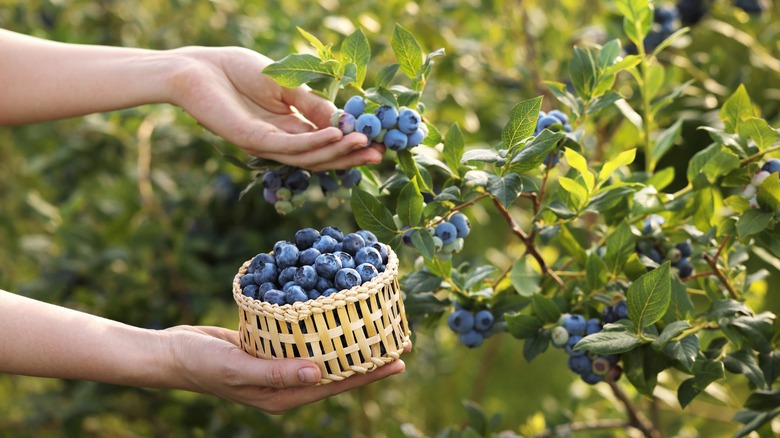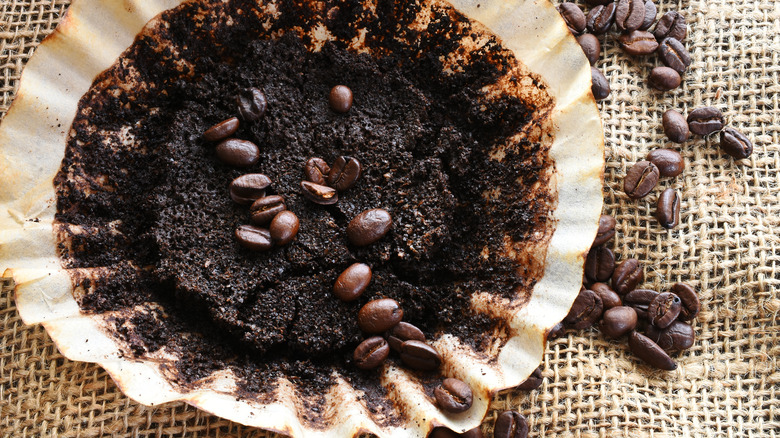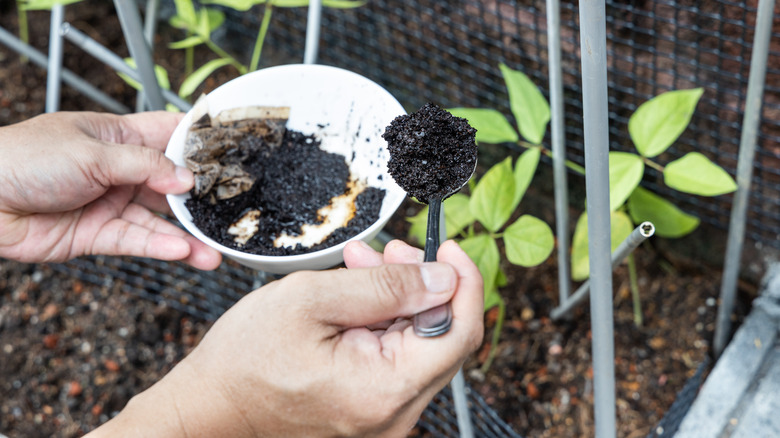The Natural Fertilizer Your Blueberry Plant Needs Is Already In Your Kitchen
If you think back to how you started this morning, you probably completed a few standard tasks, such as brushing your teeth, walking your dog, or enjoying a quick bite of breakfast. For the vast majority of folks, making coffee is a regular part of their morning routine. About 73% of Americans drink coffee every day, and 89% make coffee at home at least once per week, according to Drive Research. We don't usually think about the considerable amount of waste our coffee habit produces, but next time you make a fresh pot, don't throw out your coffee grounds. Instead, keep them for your blueberry bushes. Or if you're not a coffee drinker yourself, visit your local coffee shop to ask if they have any spent grounds you can take for your garden. One person's trash can be a plant's treasure, and coffee grounds provide vital nutrients that act like a natural fertilizer for blueberry plants.
Coffee and blueberries aren't just great at breakfast. They're a winning combination in the garden too, where the coffee can naturally boost blueberry plants by helping to achieve ideal soil conditions. If you're learning how to grow and care for blueberry plants, here's why you should consider adding coffee grounds to your soil and the best ways to incorporate it without overdoing it.
How coffee grounds can benefit your blueberry plants
When it comes to growing fresh fruits in your garden, blueberry plants are a relatively low-maintenance choice. Most varieties prefer full sun and don't require much pruning or watering, just around 1 inch per week. However, forgetting to properly fertilize your plants could be one of the biggest mistakes you're making when growing blueberry bushes. After the plant reaches a few years old and becomes more established, proper soil nutrients can be key to a bountiful berry harvest. While spent coffee grounds may seem useless to humans, coffee grounds are still chock-full of nutrients like potassium, carbon, and nitrogen — all elements that blueberry plants crave. Ensuring your blueberry plants have a good supply of these nutrients in the soil will help them to grow faster, stronger, and healthier. And they'll produce more delicious berries for you to enjoy.
The idea of drinking black coffee might make you scrunch your nose, but coffee's acidic nature is another brilliant benefit for blueberries. Blueberry plants love to grow in highly acidic, sandy, and loamy soil. Adding coffee grounds to the soil can be a simple, easy way to lower the pH, which could be crucial if you're trying to grow blueberries in soil that leans toward a neutral or alkaline pH. As an added bonus, coffee has also been shown to repel insects with its strong scent and even kill slugs with its caffeine content.
How to use coffee grounds around your blueberries
Using coffee in the garden is pretty simple, but it's still important to apply coffee grounds the right way. Toss a couple of spoonfuls into the ground before planting a new blueberry bush or dilute with water to pour around the base before watering into the soil. You can also mix old coffee grounds into your compost or potting soil when growing container gardens or raised garden beds. After doing this, you can reapply coffee sparingly every two to three months, or as an alternative to commercial fertilizer during the best time to fertilize your blueberry plants.
Be careful not to apply coffee grounds too often or too densely, as too many grounds could block water from seeping through to your plant's roots or alter the soil pH too much. If you're not sure what kind of soil you're working with, it may be a good idea to perform a soil test to ensure you don't overwhelm your blueberry plants with acidity.
You might be wondering, will Keurig K-Cups and other coffee pods work too? In most cases, yes! K-Cups and many other single-serve coffee pods contain ground coffee that is pushed through a self-contained filter, so you can open up the pod once cooled and use the old coffee grounds. Just be sure to stay away from coffee pods with any elaborate flavorings or additives, like instant cappuccino mixes.


